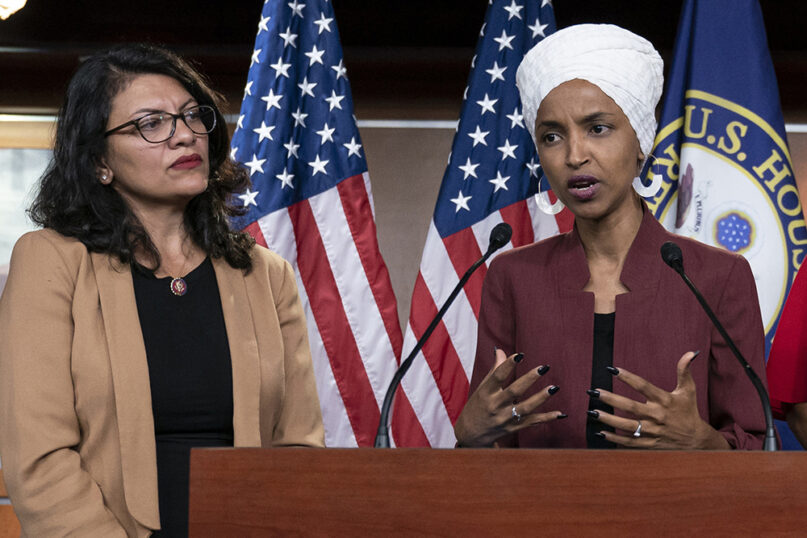(RNS) — Zohran Mamdani’s election as New York City mayor is being celebrated by many as a new political height for Muslims, even as the 34-year-old’s astounding rise is shadowed by a persistent, if unsurprising, increase in Islamophobic attacks, against him and other Muslim politicians.
A day later in Germany, meanwhile, the government announced a ban on a group called Muslim Interaktiv for allegedly “threatening constitutional order.” The action followed government raids on the premises of other groups authorities referred to as purveyors of “modern TikTok Islamism.”
The fate of Muslims in two leading Western democracies could not seem to be more different, with one country appearing to welcome more political integration for Muslims and the other restricting what is acceptable. But a deeper look reveals that Muslim “success” stories in the U.S. are often a matter of interpretation, obscuring ongoing and significant challenges. Meanwhile, the negative narrative in Germany misses profound, albeit uneven, progress.
U.S. Muslims — who, at 3.5 million to 4.5 million, constitute around 1% of the population — are a highly diverse group, hailing from at least 68 different countries from South Asia to eastern Africa, as well as Arab nations such as Syria, Iraq and the Palestinian territories, and from the United States. African Americans make up about 20% of the U.S. Muslim community.
According to research from the Institute of Social Policy and Understanding, American Muslims are highly educated, enjoy high rates of employment and generally are on a par with the U.S. middle class. Many are immigrants who come via skilled immigration pathways. Muslims enjoy strong representation in professional fields — though they are also the most likely religious group in the U.S. to be poor.
This economic foundation, combined with a political system that offers multiple avenues for local and national engagement, has provided a platform for political visibility and success. The past decade has seen the election of prominent Muslim politicians, including the first two female Muslim members of Congress, Ilhan Omar and Rashida Tlaib, as well as the attorney general of Minnesota and several mayors. Muslim Americans also enjoy influence and prominence in local civil society from Tampa to Dearborn, from Minnesota to Virginia.

In this July 2019 file photo, U.S. Rep. Ilhan Omar, D-Minn., right, speaks as U.S. Rep. Rashida Tlaib, D-Mich., listens during a news conference at the Capitol in Washington. (AP Photo/J. Scott Applewhite, File)
However, this success obscures ongoing struggles and structural issues. American Muslims experience tensions between a narrative of religious freedom and pluralism on the one hand, and the constant reality of post-9/11 surveillance, political suspicion and xenophobic racism on the other. Though individuals may achieve professional milestones, the community as a whole remains racialized and subject to pervasive Islamophobia — often funded and institutionalized by organizations that promote a fear-mongering narrative.
The political success of Muslim representatives, while pathbreaking, may give the community access to power, but that power does not equal freedom from prejudice. Their visibility is a triumph, and a point of constant vulnerability.
In Germany, the country’s 5.5 million Muslims make up a larger segment of the population, at 6.6% of the whole. They largely come from the Turkish Gastarbeiter (guest worker) generation, invited by the German government in the 1960s to bolster the workforce as West Germany’s economy boomed. These guests, however, were never expected to stay, and though 3 million of them are now citizens, the government failed to offer language courses, citizenship pathways and other support. They are still largely underrepresented in higher education, politics, society and business.
Despite those structural disadvantages, the sheer size and grit of this community have led to breakthroughs. Secular Muslim Cem Özdemir, of the German Green Party, rose to co-leader of the party and minister of food and agriculture in 2021. Aydan Özoğuz, of the center-left SPD, was vice president of the Bundestag, the German parliament, from 2021-2025 and is a former commissioner for immigration, refugees and integration. Belit Onay, a “liberal Muslim” and Green Party politician, became the first person of Turkish descent to be elected mayor of a major German city (Hannover) in 2019.
The community has also had prominent breakthroughs in film and the arts, from the internationally renowned director Fatih Akın, born to Sunni Muslim parents, to author and actress Emine Sevgi Özdamar, whose work explores themes related to Islam in a post-9/11 world.
When refugees from Syria, Afghanistan and Iraq began to arrive in 2015, the government did more to help the newcomers with language and vocational training, though rates of unemployment remain high. While the refugees’ path into mainstream society has been bumpy, Berlin and other cities have become major centers for Arab intellectual life, thanks in part to government funding for Arab music, arts and academic pursuits. Described as a “capital of Arab exile,” Berlin’s numerous cultural initiatives, institutions and organizations support Arab voices, contributing to a dynamic and growing intellectual and artistic community.
Many of these recent newcomers are still not citizens and face an uncertain future in the country, thanks to a recent hard-line turn in German immigration policy. Nonetheless, progress for the descendants of the Gastarbeiter generation and the more recently arrived is tangible.
Yet a major challenge for German Muslims remains what could be called the recurring antisemitism “blame game.” German political and media discourse consistently attributes antisemitism to Muslim immigrants, despite statistics that show that the vast majority of antisemitic crimes are committed by white, right-wing German extremists.
As Oliver Schmidtke noted in his recent analysis of hate crime statistics, this disproportionate focus on the Muslim minority serves to distract from the endemic threat of far-right extremism and simultaneously reinforces the narrative of the Muslim as the perpetual “other.” This has fueled debates over everything from mosque construction and headscarf bans to the “image” of German cities, as evinced by Chancellor Friedrich Merz’s recent, and controversial, comments about immigration and integration.
Antisemitism among some German Muslims is an issue that needs to be addressed, but by focusing blame on Muslim communities, politicians are effectively distracting from the pervasive problem of far-right radicalism in the country and simultaneously fueling anti-Muslim prejudice.
This is what makes the seeming contrast between American and German Muslim experiences deceiving. In the U.S., anti-Muslim rhetoric often portrays the community as a security threat — see how Mamdani’s opponents attempted to tie him to the 9/11 attacks on New York City. By and large, Muslims are free to express themselves and pursue full lives, but the Islamophobic narrative generates personal harassment, undue surveillance and public criticism, with the most prominent individuals targeted more than anyone else.
In Germany and Europe more broadly, fear of Islam shows up as questions about national identity. Islam is seen as fundamentally incompatible with “Western values.” While individuals may find success, the structural discrimination impacts entire generations’ access to education, housing and upward economic mobility.
In both places, Muslims have their own serious struggles that look very different from abroad. But each community is in its own way slowly overcoming the respective limitations put on it by society.
(Ken Chitwood is a religion scholar based in Germany. He is the author of the new book “Borícua Muslims: Everyday Cosmopolitanism Among Puerto Rican Converts to Islam.” The views expressed in this commentary do not necessarily reflect those of Religion News Service.)
